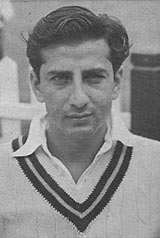Fazal Mahmood
|
|

|
The key factor in Pakistan's unexpected victory over England at The Oval in 1954 was the medium-fast bowling of vice-captain Fazal Mahmood, who took twelve wickets for 99 runs. That was only one of Fazal's consistently good performances in England which earned him an exceedingly high valuation.
Known as "The Alec Bedser of Pakistan", Fazal fully lived up to his reputation. In first-class matches he headed the Pakistan bowling averages with 77 wickets for 17.53 runs each and his 20 Test wickets were more than double the next best for Pakistan. His part in Pakistan drawing the rubber, the receipt of a Cup and a cheque for his Oval Test achievement, judged the finest individual feat of the season, and selection as the first Pakistan player in Wisden's Five Cricketers made 1954 memorable for Fazal.
In build, run-up and bowling action, Fazal does not resemble Bedser, but their bowling methods bear a distinct similarity. Both concentrate on varied swing and a mixture of leg-cutters and break-backs at just above medium-pace; both are masters of length.
Born at Lahore, on February 18, 1927, Fazal made his mark in school cricket. His father, a professor of Economics at Islamia College, Lahore, and President of the College Cricket Club, encouraged Fazal to practice assiduously and from the age of ten the boy played regularly in the College nets. When 13, he joined the College and in his second year won a place in the first eleven. A year later, when still much younger than most of his cricket companions, he set up a University record for the Punjab area with five wickets for 13 in the final of the Inter-College tournament. During six years at college Fazal began playing first-class cricket in India's Ranji Trophy tournament. As Pakistan was not then a separate country, Fazal represented Northern India. From early days he could bowl a natural fast leg-break with plenty of wristwork, but when entering senior cricket he changed his action slightly. By eliminating the wrist-action and using his fingers more, Fazal deceived batsmen who found increasing difficulty in discriminating between the leg-cutter and the break-back.
In the 1946 Trial matches for the Indian team to tour England, Fazal did extremely well and narrowly missed selection. When they returned from England, the India side met The Rest and Fazal's bowling contributed much towards The Rest's comfortable victory. About this time a century by him for North against South at Bombay in the Zone trial games held to select the team to visit Australia in 1947-48 helped to make his choice a certainty. Five months after the team was announced, however, partition took place between India and Pakistan and only India players went on the tour, Fazal standing down.
Pakistan were so concerned in establishing themselves as a country that Fazal found few opportunities for first-class cricket, but interest developed when West Indies visited Pakistan in 1948. In 1949-50 Fazal was the leading Pakistan bowler on a tour of Ceylon and when Ceylon returned the visit in 1950, he took 20 wickets in two representative matches.
Cricket took a firm hold on Pakistan during the tour by M.C.C. at the end of 1951. In the first game, at Sialkot, in which M.C.C. just saved the follow-on, Fazal dismissed five batsmen for 58. At Karachi, where Pakistan beat M.C.C. by four wickets, Fazal took six for 40 in the first innings. That victory did much towards earning Pakistan Test match status and in October, 1952, they toured India as a fully-fledged cricket nation. Although losing the series, Pakistan won one Test. With 20 wickets for 25.51 runs each, Fazal headed the Test bowling averages.
Many of Fazal's successes were gained on matting pitches and the Pakistan authorities, realising that their cricketers might be at a disadvantage when touring England, sent a party of young players, styled the Pakistan Eaglets, here in 1953. Fazal was among them and, besides learning about English conditions, he benefited from the coaching of A. R. Gover, the former Surrey fast bowler.
A special feature of Fazal's bowling is his astonishing stamina. For this he owes much to his father, who insisted on a rigid training schedule. From 1940 to 1947 Fazal went to bed no later than 10 p.m. He rose each morning at 4.30 a.m., and whatever the weather, walked five miles and ran five miles.
After leaving college, Fazal joined the Pakistan services as an inspector of Police. In 1952 he was promoted to Deputy Superintendent. -- L. S.

